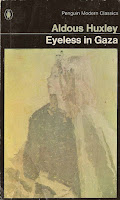Book Of Note: Eyeless in Gaza
 'Eyeless in Gaza'. First published in 1936, it is a strange title for a very interesting book. Considered by many, including I, to be Aldous Huxley's masterpiece - the title of this novel refers 'to the Biblical story of Samson. Having told Delilah the secret of his strength - that it depended on his hair remaining uncut - Samson was betrayed to his enemies the Philistines, and taken with a shorn head to be a slave in their city of Gaza. Blinded to make him harmless, he was forgotten until brought before the crowd on a feast day. By then his hair had regrown, and even blind he was able to pull down the temple on the heads of the celebrating Philistines (and kill himself at the same time)'.
'Eyeless in Gaza'. First published in 1936, it is a strange title for a very interesting book. Considered by many, including I, to be Aldous Huxley's masterpiece - the title of this novel refers 'to the Biblical story of Samson. Having told Delilah the secret of his strength - that it depended on his hair remaining uncut - Samson was betrayed to his enemies the Philistines, and taken with a shorn head to be a slave in their city of Gaza. Blinded to make him harmless, he was forgotten until brought before the crowd on a feast day. By then his hair had regrown, and even blind he was able to pull down the temple on the heads of the celebrating Philistines (and kill himself at the same time)'.I first read the book as young man and it is the first of Huxley's books that I read, then; it is this book that influenced me to read several more of his books (most of his other books are very different from 'Eyeless in Gaza'). As always when reading good books or articles, I like to scribble notes or quotations. Here are a few quotations I noted from the book, then (with comments I made, in brackets), when first reading it:
"Man is constantly changing from one form of slavery to another." (Very true. What am I a slave of now?)Reading the book, as it is rather haphazardly and not chronologically arranged and has many flashbacks, you need to be very attentive and focused to piece all the events together as you go along reading, and especially at the end of the book. The novel has many great ideas, and for a psychiatrist or psychologist - it is very insightful on how people's character, personality and behavior are shaped with/through time. Many of Huxley's points and messages in this book are relevant now as they were then.
"People with money and power are freer than the poor at any rate. Less completely conditioned by matter and other people's wills." (Very true.)
"Behavior and modes of thought are the outcome of economic circumstances." (I don't agree. I have to ponder on that.)
"You cannot use violent unjust means to achieve peace and justice! Means determine ends. violence and war will produce a peaceful and social organization having the potentialities of more violence and war. Peace and social justice are only obtainable by means that are just and pacific." (But many times in history, violence is the only way to bring change.)
"Men with strong religious faith, men with well-thought-out plans for improving the lots of their fellows whether in this world or the next, have been more systematically cold-blooded and cruel than any others." (Agreed and very true.)
"Force may subdue, but love gains and he who forgives first wins the laurel." (Needs more thought.)
"It's indifference and hatred that are blind, not love." (True)
"People are detestable, because we detest them. If we like them, they'd be likable............................all men are capable of love for all other men. But we've artificially restricted love by means of convention, hatred and violence. Restricted it within families and clans, within classes and nations." (Sounds true - which convention, clan and nation am I restricted in? I don't feel restricted.)
+ Goodreads
+ Google Books

